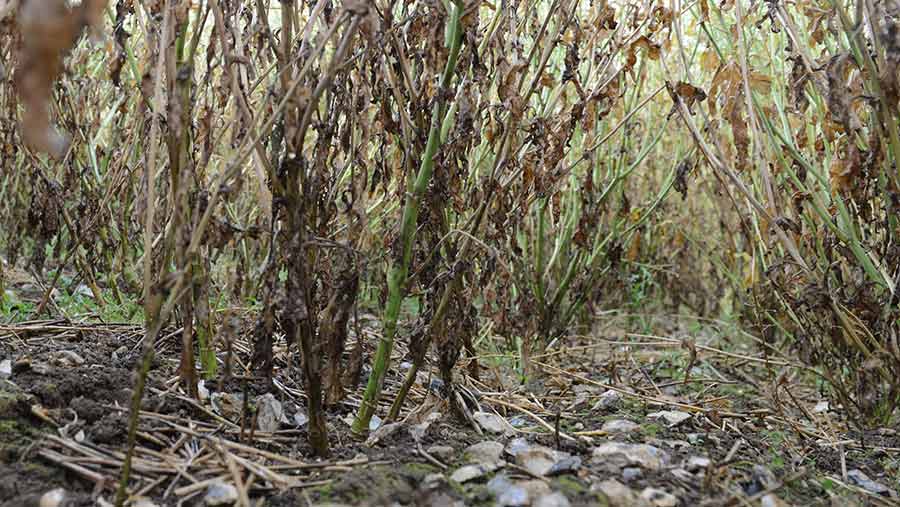
- Select a language for the TTS:
- UK English Female
- UK English Male
- US English Female
- US English Male
- Australian Female
- Australian Male
- Language selected: (auto detect) - EN
Play all audios:
© A new Stem Health score is set to help growers identify the best oilseed rape varieties to grow with good resistance against three key yield-sapping stem diseases. Limagrain arable
technical specialist Liam Wilkinson says that keeping stems as green as possible enables crops to reach their yield potential, “so any nitrogen in the crop goes up into seed, maximising
yield and oil content”. See also: Tips on getting the most from clubroot-resistant OSR varieties There are four key stem diseases in oilseed rape: phoma/stem canker, cylindrosporium (light
leaf spot), verticillium wilt and sclerotinia. However, sclerotinia can be easily managed with fungicides, so the focus is on the other three diseases (see table), which can lead to yield
losses of 25%-50% in heavy cases. Mr Wilkinson says enhanced genetics is the most effective solution. THREE KEY STEM DISEASES OF OILSEED RAPE DISEASE PHOMA/STEM CANKER (PHOMA LINGAM)
CYLINDROSPORIUM (CYLINDROSPORIUM CONCENTRICUM) VERTICILLIUM WILT (VERTICILLIUM LONGISPORUM) FAVOURABLE CONDITIONS Warm and wet conditions in autumn and spring Windy and rainy conditions
during autumn and spring (5-15C) Light soils, medium soil moisture, warm temperature (>20C) IMPACT ON YIELD Up to 50% yield loss in heavy cases Up to 25% yield loss in heavy cases Up to
30% yield loss in heavy cases CHEMICAL SOLUTIONS Fungicide available, medium efficiency Fungicide available, low efficiency No chemical solution GENETIC SOLUTIONS Good level of resistance
available The breeder has developed a robust classification and assessment of varieties and only the top ones will be labelled with the Stem Health label. High resistance to all three
diseases is mandatory to get the Stem Health label, therefore, only one single weakness leads to exclusion from the Stem Health list. For example, Limagrain marketing manager Will Charlton
points to Wagner, which has good phoma (6) and excellent light leaf spot (7) scores, but its verticillium wilt resistance does not meet the threshold. “It’s not a bad variety, but growers
should avoid growing it on land where verticillium wilt is known to be a problem. That’s why its suited for growing in the north.” Attica, which is Limagrain’s highest yielding variety on
the current Recommended List, does meet the threshold for all three, so can be grown across the UK. Recommended List variety Auckland also carries the label. Seed is available for drilling
this summer and Mr Charlton believes Attica could take up to 10% of the certified seed market share. Four candidate varieties have also got the Stem Health labels. AHDB TOP-YIELDING VARIETY
ON AHDB RECOMMENDED LIST FOR THE UK VERSUS STEM HEALTH VARIETIES Trait Turing Attica (Stem Health) Auckland (Stem Health) Gross output UK (%) 107 107 106 Stem stiffness 8 8 7 Light leaf
spot 7 7 7 Phoma 5 7 7 _On a scale of 1-9, where 9 expresses the characteristic the strongest_






